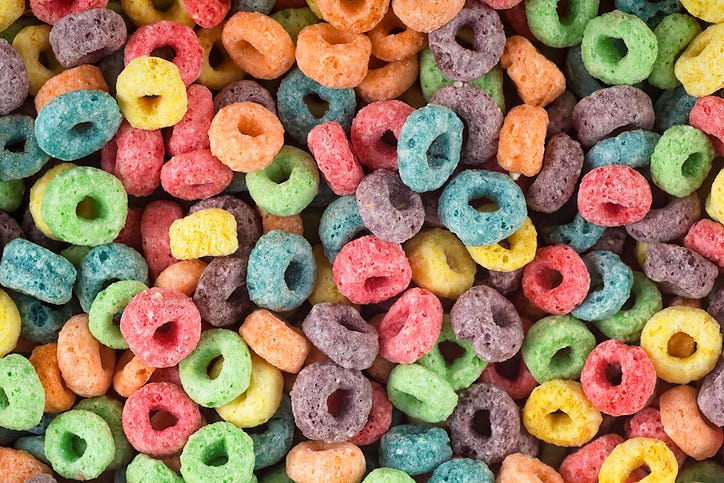
A movement is growing in several states to prohibit the use of certain dyes and harmful chemicals in food, which could lead to popular snacks like Froot Loops, Skittles, Pez, M&M's, Doritos and more being banned.
Last year, California passed the so-called "Skittles ban," which outlaws foods and drinks that contain red dye No. 3, potassium bromate, brominated vegetable oil and propylparaben starting in 2027. The food additives are already prohibited from use in the European Union and many other places around the world.
Although the legislation doesn't outright ban any products, it forces companies to make changes or recipe tweaks to be compliant with the law or choose not to put their products on store shelves.
Now, other states are trying to take similar actions.
More than 10,000 chemicals are allowed for use in food sold in the U.S., all of which are designed to do a specific job -- like preservation, coloring and sweetening. Most commonly used additives were approved by the Food and Drug Administration decades ago and although they're considered "generally recognized as safe," studies have linked them to health issues in humans, including cancer, organ damage, reproductive issues, harm to the nervous system, damage to DNA and behavioral and developmental issues in children.
According to Consumer Reports, more than a dozen chemicals and dyes are being targeted by multiple states, including:
• Azodicarbonamide -- used as a whitening agent and to strengthen bread in more than 50 common supermarket products, most of them packaged breads, rolls and pastries.
• Brominated Vegetable Oil (BVO) -- used in more than 80 sodas and fruit-flavored beverages to keeps citrus flavoring from separating and floating to the top.
• Butylated Hydroxyanisole (BHA) -- widespread use in a variety of items -- from butter, oils and nuts to baked goods, cereals, potato chips and meat products -- to prevent foods that contain oils, fats and shortenings from going rancid.
• Potassium Bromate -- used as a flour improver to strengthen dough and make it rise higher in more than 200 products, including packaged breads and frozen foods.
• Propylparaben -- used to prevent mold and bacteria growth in more than 50 grocery items, such as packaged corn tortillas, baked desserts, and cake icing.
• Titanium Dioxide -- used in thousands of grocery products, including popular candy, to give a smooth texture or as a food coloring to make products appear whiter.
• Red Dye No. 3 -- used in hundreds of products from candy and soda to baked goods and cereals to give food a bright, red color.
• Red Dye No. 40, Yellow Dye No. 5, Yellow Dye No. 6, Blue Dye No. 1, Blue Dye No. 2, Green Dye No. 3 -- used as food coloring in thousands of products, from beverages to cereals.
Food safety advocates in favor of targeting the additives say the FDA has failed to take action to protect consumers from toxic chemicals found in our food
Those in opposition say the FDA should be responsible for determining the safety of food additives, not individual states.
"States usurping FDA's authority does nothing but create a patchwork of inconsistent requirements that increase food costs, create confusion around food safety, and erode consumer confidence," Christopher Ginlesperger, at the National Confectioners Association, told Consumer Reports.
